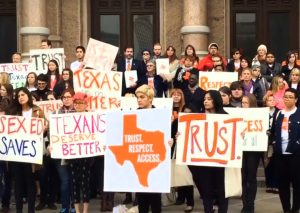The Texas Supreme Court intervened on Friday night, placing a temporary hold on a lower court’s decision that would have permitted a pregnant woman to undergo an abortion despite the state’s stringent ban on the procedure in cases of fatal fetal diagnosis. This move by the all-Republican state Supreme Court came over 30 hours after a lower court judge granted 31-year-old Kate Cox a temporary restraining order, preventing the state from enforcing its abortion ban in her specific case.

In a concise one-page ruling, the state Supreme Court stated that it was temporarily staying the lower court’s decision “without regard to the merits,” providing the court with additional time to thoroughly consider the case. Molly Duane, a senior staff attorney at the Center for Reproductive Rights, representing Cox, expressed concern about the potential delay in justice, emphasizing the urgency of the medical care needed. Cox, at 20 weeks of pregnancy, is facing a critical situation, highlighting the need for swift resolution without resorting to legal battles.
Cox’s legal team, respecting privacy and safety concerns, has refrained from disclosing her abortion plans. In a filing with the Texas Supreme Court on Friday, they indicated that Cox was still pregnant. The Dallas-area mother of two initiated the legal challenge when she was 20 weeks pregnant, seeking approval for an abortion due to a high-risk diagnosis of trisomy 18, a condition associated with a high likelihood of miscarriage or stillbirth and low survival rates.
This legal battle is seen as the first of its kind since the U.S. Supreme Court overturned Roe v. Wade last year, allowing states to enact their own abortion laws. However, the restraining order issued on Thursday applied solely to Cox and not to other pregnant women in Texas.
Cox’s physicians have advised against inducing labor if the baby’s heartbeat stops, as it poses a risk of uterine rupture due to her previous cesarean sections. Additionally, a full-term cesarean section would jeopardize her ability to carry another child. Texas Attorney General Ken Paxton, a Republican, argued that Cox does not meet the criteria for a medical exception to the state’s abortion ban and urged the state Supreme Court to take action.
Despite Thursday’s ruling by state District Judge Maya Guerra Gamble, Paxton labeled her as an “activist” judge. Furthermore, Paxton warned three hospitals in Houston of potential legal consequences if they allowed Cox’s physician to perform the abortion. The case reflects the ongoing legal and ethical challenges surrounding abortion rights in Texas and raises questions about the intersection of state laws, medical considerations, and individual reproductive choices.

